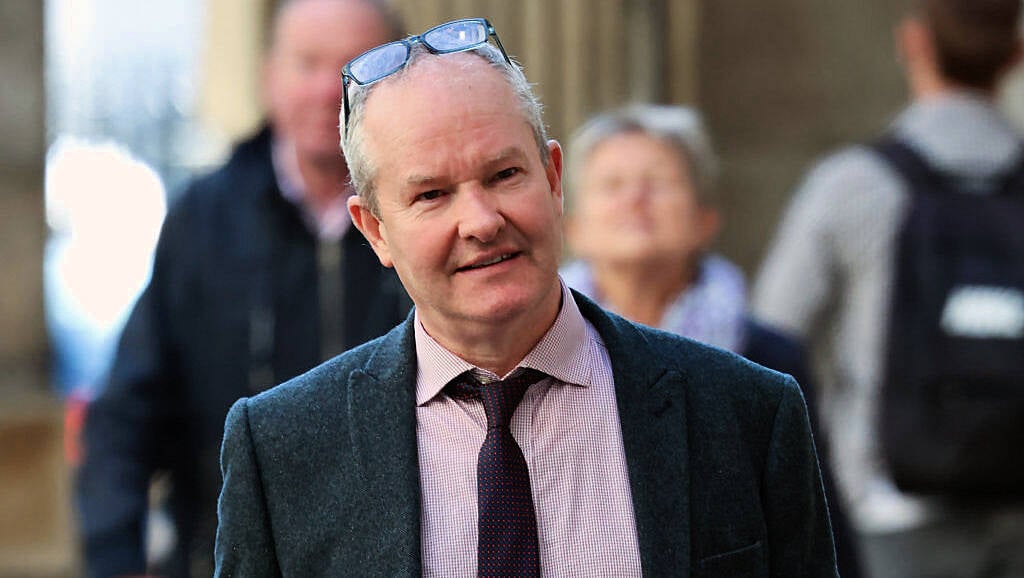A family doctor accused of professional misconduct over his public comments on Covid-19 measures and restrictions has criticised virtually every aspect of the State’s response to the pandemic, a medical inquiry has heard.
An expert witness told a fitness-to-practise hearing of the Medical Council that Marcus de Brun, who operated his own medical practice in Rush, Co Dublin, had disagreed with numerous public health guidelines and initiatives in a large number of posts on his Twitter account.
Colin Bradley, head of the Family Medicine Department at the RCSI/UCD Malaysia Campus in Penang with over 30 years of experience in general medicine, said it was hubris for a single practitioner to believe he had more expertise or wisdom than an expert body established to advise the Government on managing a once-in-a-lifetime pandemic.
A report prepared for the Medical Council by Prof Bradley acknowledged that the views held by Dr de Brun were sincere. However, it also noted that these views were out of kilter with the more widely held beliefs of most scientists and physicians. The report described the GP’s opinions on Covid-19 vaccines as alarmist.
Dr de Brun faces ten allegations of professional misconduct over his criticism of public health guidelines, lockdowns, facemask mandates, and Covid-19 vaccines introduced during the pandemic. The Medical Council claims his comments and actions were inappropriate, undermined public health guidelines, and contravened sections of the Guide to Professional Conduct and Ethics.
Dr de Brun resigned from the Medical Council in April 2020, citing the State’s failure to protect nursing home residents as his reason.
During evidence on the third day of the inquiry, Prof Bradley acknowledged that some of Dr de Brun’s criticisms of the State’s pandemic response were legitimate. He said that most people, including members of the National Public Health Emergency Team (NPHET) which oversaw the Government’s handling of the pandemic, would probably accept that the decision to discharge patients from hospitals into nursing homes without adequate testing was a misstep in the early days of the virus.
Prof Bradley also stated that it was reasonable for Dr de Brun to engage in debates and write articles about his views. However, he emphasized that there were more appropriate channels to convey such opinions than social media, which risked undermining public health guidelines.
The witness observed that it was more reasonable that Dr de Brun had been one of over 20 GPs who submitted an alternative strategy for responding to the pandemic—a strategy Prof Bradley believed was considered by NPHET.
He told counsel for the Medical Council, Neasa Bird BL, that he believed the allegations constituted professional misconduct. He described the GP’s conduct as potentially disgraceful and dishonourable, failing to meet the standards expected of doctors, particularly in relation to social media use.
Prof Bradley said the GP’s tweets were misleading and encouraged people to disregard public health guidelines. He agreed with Ms Bird that their contents were potentially falsely reassuring.
Regarding Dr de Brun’s Twitter bio, in which he stated his views were personal and did not reflect those of the medical profession, Prof Bradley said this was an attempt to distance himself. However, he added that it was an unfortunate burden of being a registered practitioner that public statements are seen as representing the medical profession.
Prof Bradley noted that the Guide to Professional Conduct and Ethics extends beyond the limitations of day-to-day work in a GP practice, and doctors bear responsibility for what they say in any public forum. He added that the public places significant trust in doctors’ words and often follows their guidance.
He observed that the Covid-19 pandemic was a very dynamic situation, with circumstances evolving daily. Prof Bradley believed it was important that health professionals avoid jumping the gun and making premature announcements before clear-cut evidence is available.
As understanding of the pandemic and its management improved over time, he stressed the importance of doctors remaining aware of expert opinions and advice from those studying the virus closely.
Prof Bradley also remarked that lockdowns and seeking a vaccine were standard public health responses to infectious diseases that made perfect sense.
He said it was crucial for medical professionals to “sing from the same hymn sheet” as it would be difficult for the public to respond consistently if confronted with conflicting messages.
Prof Bradley emphasized that scientific information must be collated and examined by appropriate bodies, whose guidance is subsequently followed.
He criticized Dr de Brun’s attendance at a public rally at the Custom House in Dublin on August 20, 2022, where he failed to wear a facemask and observe social distancing. Additionally, Prof Bradley noted that the GP shook hands with individuals at a time when people were advised to avoid such contact.
Prof Bradley highlighted that Dr de Brun’s comments suggested vaccines were dangerous and should not be administered, particularly to children, while he had dismissed the virus’s severity as comparable to a “nasty cold.” The GP also reportedly disparaged the medical profession.
The inquiry was adjourned until Friday, when Prof Bradley is due to be cross-examined by Dr de Brun, who is representing himself at the hearing.
https://www.breakingnews.ie/ireland/gp-accused-of-professional-misconduct-criticised-entire-state-pandemic-response-inquiry-hears-1811088.html


